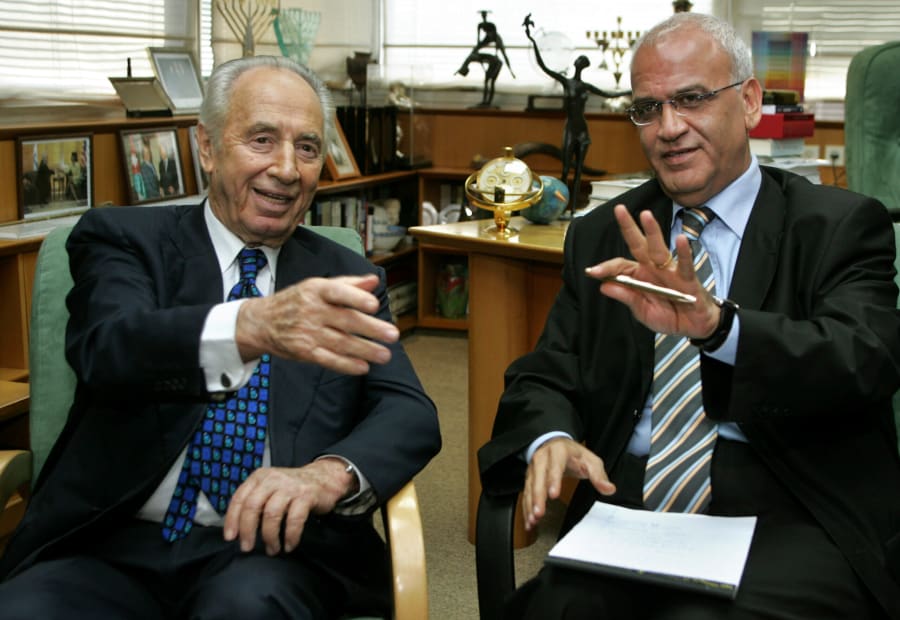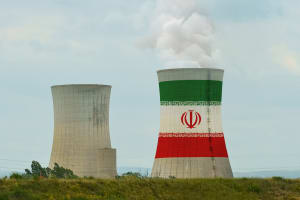In memory of Saeb Erekat: I met and interviewed him in 2005
Reflections on the Palestinian peace negotiator who never made peace

Today is a sad day in the Palestinian Authority.
They have lost one of their most colorful and memorable leaders.
In the fall of 2005, I had the opportunity to meet and interview Saeb Erekat, who lost his battle with COVID-19 at an Israeli hospital on Tuesday morning.
I was attending a conference titled, Peace: Dream or Vision?, commemorating the tenth anniversary of the assassination of Yitzhak Rabin, the beloved Israeli prime minister who signed the historic peace treaty with Jordan’s King Hussein in 1994.
The site was the Strategic Dialogue Center of Netanya Academic College and it was a fascinating event.
One moment I was watching former Mossad chief Danny Yatom chatting like old buddies with Dr. Abdel Salam Majali, the former Jordanian prime minister, and Osama El-Baz, the chief political advisor to Egyptian president Hosni Mubarak.
The next moment I was watching Erekat, the Palestinians’ chief negotiator, give a bear hug to former Israeli Prime Minister Shimon Peres.
Once they were all enemies. Now they were all friends.
Once they were plotting each other’s demise.
Now they were talking about their shared vision for a “new Middle East.”
Things would eventually deteriorate badly. But at the time the relationships were warm. As I explained in my 2006 non-fiction book, Epicenter, “such warm relationships between Arab and Israeli leaders may seem insignificant, but they most certainly are not. They actually represent enormous progress toward resolving the conflict.”
Then I shared an anecdote to provide some context.
In April of 1988, ABC’s Ted Koppel took his daily news program, Nightline, to Israel for a week of broadcasts on the outbreak of the Palestinian uprising known as the intifada and the increasingly desperate need for peace and reconciliation between the two sides. Having recently returned to the States after nearly six months in Israel, where I had studied at Tel Aviv University and witnessed the outbreak of the intifada, I watched Koppel’s show with great interest every night in my dorm room at Syracuse University.
On April 25, Koppel held the first-ever town hall meeting between Israelis and Palestinians, broadcast live from the historic Jerusalem Theater. It was bound to be riveting television, for never before had Israeli and Palestinian leaders sat on the same stage together, much less engaged in anything close to a dialogue. But when the show began, I was surprised to see a three-foot-high stone wall running down the middle of the stage. The Israelis sat on one side, the Palestinians on the other. It was a sad symbol of the divide between the two peoples.
Years later, I was interviewed by Koppel on Nightline. After the taping was finished, I had the opportunity to ask Koppel about that wall.
“It came up at almost the last minute,” he explained, remembering the moment vividly. “We were just a few hours from going on live from Jerusalem—at 6:30 in the morning, Israel time, mind you, so that the show would be on at 11:30 p.m. back in the U.S.—and suddenly the Palestinians said they refused to appear onstage with the Israelis without sitting in a booth, so they didn’t appear to actually be talking to the Israelis. We said absolutely not. So they asked that we put razor wire down the center of the stage, and again we said no. Finally, they asked that we build a wall—just a small wall, they said—to represent how divided Arabs and Jews are. They threatened not to appear at all if we didn’t do it, so we did it. It was an amazing night.”
It certainly was.
And one of the Palestinians who appeared onstage that night was Saeb Erekat.
Then, Erekat had refused to shake hands with the Israelis. He had barely made eye contact with them. And he had demanded a wall. Now, at the peace conference in Netanya, he was giving bear hugs. How much the world had seemed to change.
At the conference, Peres, then in his eighties, told the assembled dignitaries that he believes the Middle East is entering “a new age” and that he has never been more optimistic that a final peace agreement with the Palestinians can be reached in the not-too-distant future.
“The Lord is in charge of the beginning and the end, but we are responsible for the middle,” Peres said, insisting that there is no contradiction between fighting terror and negotiating for peace. “When a cat is chasing a mouse, there’s no sense for the mouse to ask for a ceasefire. He must deal with the cat and ensure his own safety.”
After Peres’s keynote address, I had a few minutes to interview the former prime minister. “Is it your sense that Israel is more secure today—before we get to the point of the Iran nuclear bomb—than it has been in its history so far?” I asked.
Peres agreed with that assessment.
“I would say that Israel’s security was globalized,” he explained in his distinctive, gravelly voice, suggesting that with the U.S. as a strong ally, the fall of Saddam Hussein in Iraq and peace treaties in place with Egypt and Jordan, the threat Israel then faced was “the problem of terror, rather than a classical attack” by a conventional Arab army or air force.
Had the passing of former PLO leader Yasser Arafat—the Nobel Peace Prize winner who never actually made peace—helped or hurt the prospects for a final deal with the Palestinians? I asked.
“With him, [the peace process] wouldn’t have started,” Peres insisted. “With him, it wouldn’t be finished.”
When Peres’s address was complete, attention turned to Erekat—the bald, tanned, fiery chief diplomatic spokesman for the Palestinian Authority—who delivered remarks on behalf of President Mahmoud Abbas.
Erekat was as passionate as ever but not nearly as provocative as I had heard him in the past. To the contrary, he said he believed “it’s probable that we would have had peace if Mr. Rabin had not been assassinated” and called Israel’s evacuation from Gaza “an historic step.”
Then he stunned me and much of the audience by saying that he and Abbas believed the end of the conflict with Israel was not only in sight but within reach.
“We are prepared to make a final settlement with Israel,” Erekat said, explicitly on behalf of Abbas. “We have the experience. We have the knowledge. We have learned from our mistakes. . . . We need no more than six months to conclude a final peace agreement with the Israelis. . . . What we are going through now are labor pains.”
Erekat went on to clarify that neither Abbas nor he was saying that a final deal would be wrapped up six months from then, November 2005.
But they were saying that once Palestinians and Israelis held elections, put their governments in place, and finally came back to the negotiating table ready to get serious, enough of the diplomatic work had already been done that both sides were now truly within striking distance of a historic deal.
After Erekat stepped down from the podium, I met with him outside the conference center to press him on that point.
“You really think you’re within six months of a deal?” I asked, still wondering if I had heard him right.
Apparently, I had.
Erekat not only confirmed what he had told the roomful of Arab and Israeli diplomats, ex-military leaders, professors, political analysts, and students. He actually went further.
“What people don’t know is that me and my [Israeli] colleagues in the last days of [the administration of Israeli prime minister Ehud] Barak drafted three chapters of a permanent status treaty.” Most of the work was finished, he told me. “You don’t need to reinvent the wheel now. We know what it’s going to take.”
Still a bit taken aback, I asked him, “Isn’t this the most optimistic a Palestinian negotiator has ever been?”
He shook his head.
“Look, I don’t base anything on optimism or pessimism,” Erekat said. “But when I say this line on behalf of my president, I know what I’m talking about. . . . We’re doing this because we realize it’s not a zero-sum game. . . . Two states. This is it. You want it? Okay, then let’s do it.”
Journalists and historians will have to explain why, then, Abbas and Erekat refused multiple Israeli peace offers. And multiple American offers. And multiple offers by Arab and European states to help the two sides finish the deal.
I am deeply sorry for the Erekat family for the pain and grief they are now suffering with the death of a husband, father, and key leader in the Palestinian movement. Indeed, I am praying for them and ask Evangelicals around the world to pray for their comfort at this difficult time.
But I am sad, too, that the chief Palestinian peace negotiator was never able, or willing, to make peace.

Joel C. Rosenberg is the editor-in-chief of ALL ISRAEL NEWS and ALL ARAB NEWS and the President and CEO of Near East Media. A New York Times best-selling author, Middle East analyst, and Evangelical leader, he lives in Jerusalem with his wife and sons.














